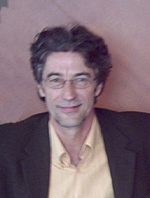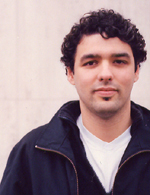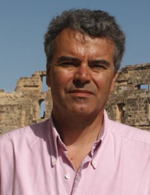September 2-5, 2008
Conference
Contributions
Practical information
Organizers
|
(Jean-Marc Robert / Marc Hassenzahl / Philippe Quéau / Roope Raisamo)

Wednesday, September 3rd
Abstract (9 Ko)
| Jean-Marc Robert is full professor at Polytechnic School of Montreal, he is also Director of the Roland-Giguère House of Technology for Training and Learning (MATI Montréal) on the campus of the University of Montreal, and Director-founder of the Research Laboratory on Human-Computer Interaction (20-25 graduate students) at Polytechnic School of Montreal. He holds a doctorate in psychology (cognitive ergonomics) from the University Paris V and has done post-doctoral studies at Xerox-PARC and NASA-Ames Research Center in California. He teaches Cognitive Ergonomics and Engineering and Human-Computer Interaction to students from different domains of sciences and engineering. His research interests deal with the analysis, design, and evaluation of user interfaces, collaborative work, and the utilization of technology for training and learning. He is the author of more 140 scientific publications in book chapters, journals, and proceedings of conferences.
Back to page top
|

Thursday, September 4th
Abstract (7 Ko)
| Marc Hassenzahl is Junior-Professor for Economic Psychology and Human-Computer Interaction at the University of Koblenz-Landau. During his time as free-lance usability consultant, usability engineer at Siemens Corporate Technology, senior consultant for the User Interface Design GmbH, and researcher at the University of Technology Darmstadt, he led or was involved in numerous Human-Computer Interaction projects ranging from the gathering of usability requirements for a new Siemens CT scanner to the development of a tool to measure product quality for Nokia. He is currently president of the German Chapter of the Usability Professionals' Association. Among his interests are usability engineering, user experience, aesthetics, new analysis and evaluation methods for the design of interactive products. He is particular interested in the positive affective and motivational aspects of interactive technologies, such as joy, fun, pride, surprise. Games, in this respect, are thought of as "models" to better understand underlying affective and motivational processes and games design as a discipline knowledgeable of how to design for them.
Since 1997, he published over 30 journal papers / book chapters and gave over 40 talks. He co-organized a whole series of conference workshops on User Experience starting with the "Funology"-workshop on CHI 2002 (with Mark Blythe and Andrew Monk). In 2006, he edited a special issue of Behaviour and Information Technology on "Empirical Studies of the User Experience" together with Noam Tractinsky (Ben-Gurion University of the Negev).
Website
Back to page top
|

Thursday, September 4th
Abstract (8 Ko)
| Philippe Quéau is a specialist of information and communication technologies (ICT), with a particular interest for computer graphics, virtual reality, tele-virtuality and cyber-communities.
Before 1996: Director of Research at Institut National de l’Audiovisuel.
Founder and Scientific Director of the International Forum on New Images of Monte-Carlo, IMAGINA.
Philippe Quéau has been regularly called for expertise on behalf of the European Communities Commission.
From 1996 to 2003, he was Director of UNESCO’s Information Society Division, responsible of UNESCO’s activities in the area of information society, information technologies, libraries, archives and public documentation, within the Communication and Information Sector. He also dealt with ethical, legal and societal aspects of cyberspace.
From 2003 to 2005: he was Representative of UNESCO to the Russian Federation, Armenia, Azerbaijan, Belarus, Georgia and Moldova. Director of UNESCO Office in Moscow.
From 2005 to date: Representative of UNESCO to the Maghreb (Algeria, Libya, Mauritania, Morocco, Tunisia). Director of UNESCO Office in Rabat (Morocco).
Philippe Quéau wrote several books on the political and philosophical impact of the Information Society, and on the evolution and implications of computer imaging, artificial intelligence and virtual reality :
-LA PLANETE DES ESPRITS – Ed. Odile Jacob - 2000
-LE VIRTUEL - Vertus et vertiges - Ed. Champ Vallon/INA - 1993 (Translated in Spanish, Italian, Finnish and in Japanese).
-METAXU : Théorie de l’Art Intermédiaire - Ed. Champ Vallon/INA – 1989
-ELOGE DE LA SIMULATION - De la vie des langages à la synthèse des images Ed. Champ Vallon/INA – 1986
Philippe Quéau’s blog
Back to page top
| |
|

Friday, September 5th
Abstract (7 Ko)
|
Ph.D., Professor Roope Raisamo has his background in computer science.
He has been doing research on human-computer interaction since 1995, specializing in multimodal interaction and constructive user interface research. Prof. Raisamo has coordinated research projects in European and transatlantic collaboration. His research projects have focused on haptic interaction, multimodal information presentation, proactive and intelligent environments and multimodal interfaces for the visually impaired children. The Multimodal Interaction Research Group lead by Prof. Raisamo is a part of Tampere Unit for Computer-Human Interaction (TAUCHI), University of Tampere, and consists of ten full-time and four part-time researchers, including the M.Sc. and Ph.D. students. The main sources of research funding have been the Academy of Finland, Finnish Funding Agency for Technology and Innovation, Nordic Development Centre for Rehabilitation Technology, and European Commission.
Website
Back to page top
|
|





